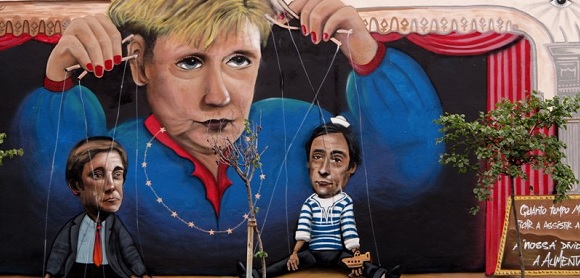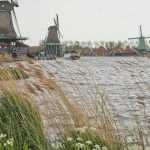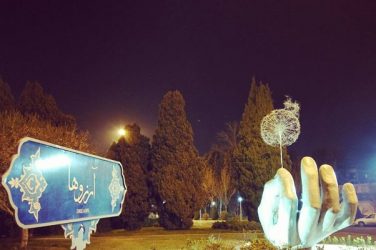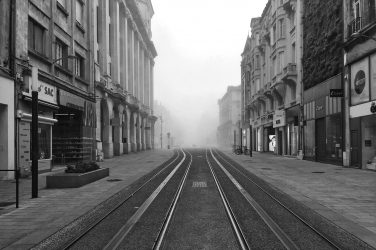It’s the Monday after elections day. Yesterday Berliners had the chance to vote for the government of Das Bundesland Berlin: the federal state of Berlin. I am reading through the local newspapers and three main topics are constantly coming up: the fact that the SPD (ruling socialist party) won the elections despite its historically low result; the fact that the new kid on the block AfD (Alternative für Deutschland, an upcoming right-wing party) won over 14% of the votes; and the fact that the CDU (Merkel’s Christian Democrats) lost so many votes that they will probably not make it into the coalition. All these topics are somehow related to the German Chancellor and Germany’s refugee crisis.
I remember the demonstrations taking place in Lisbon a few years ago, while the euro crisis and its infamous austerity programs were hitting the country hard. In those days, people were demonstrating against a lot of things: against the euro, against austerity, against the so-called Troika (IMF, ECB and EC), against Portuguese politicians, against politics in general… And against Merkel. People were carrying boards with Merkel’s face on it. People were painting graffitis of Merkel through the city. People were angry. Angry at Merkel.

Now I have been living in Germany for a year and a half and I am getting more and more fascinated by her. Within her own party (the CDU) she is loved and criticized almost at an equal level. She is against legalizing gay-marriage, yet she defends the human rights of war refugees like no one else in Europe does. She is the leader of one of the most right-wing and conservative parties in Germany; nonetheless many young, socialist, progressive and open-minded people defend her and her policies. Or at least some of them.
How can one single person have such an impact on a country and on a whole continent for that matter? Why does she trigger so many emotions in so many people? How can she be the face of so many different political decisions? How can she be right that: a face, a human being, a personality – in this age of globalizing politics?
Angela Merkel grew up in East Germany around 80km North of Berlin as daughter of a pastor. She received a full dose of DDR-related totalitarian and socialist policies just like all others from her generation. She studied Russian in school and after graduating she moved to Leipzig to study Physics. Later she came to Berlin to work and study for the Institute of Physical Chemistry located in East Berlin. When the wall came down, she became involved in the growing democracy movement and joined one of the first democratic parties of East Germany, which later merged with the CDU. She is Chancellor of Germany since 2005 and has been involved in many controversial discussions since: from her leadership during the euro-crisis, to her involvement in Europe’s external policy towards Russia, her decision to close down all nuclear power plants in Germany and her role in the current refugee crisis. For almost every year since 2006 she was chosen as one of the world’s most powerful women by the magazine Forbes. She is the face of Germany and even the face of Europe. Since last year she is also the face of ‘Wir schaffen das’.
Wir schaffen das: the German version of ‘Yes we can’. Since Merkel proclaimed these now famous words in a press conference in August 2015, everything has changed. The refugee crisis changed, Germany changed, the CDU changed. Angela Merkel, on the other hand, has not changed. During the summer of 2015, while thousands of refugees were standing at Europe’s borders, Merkel changed the game receiving all these people who had left everything behind searching for peace and well-being. To a question from a journalist at a press conference she replied: ‘we will make it work (wir schaffen das)’. Since then she has used this reply in several press conferences and interviews when asked about the possible implications of this so-called welcoming culture (Der Wilkommenskultur ) for Germany and its people. Although the current of incoming refugees has since been much more regulated and controlled, Merkel still stands by her initial position that Germany must have and does have the moral obligation of solidarity towards war refugees and that, one way or the other, ‘we will make it work’.
Not everyone was happy with this move. The federal states complained that they were not prepared to provide for the more than one million people who made it to Germany. Both the opposition and politicians from her own party have made it clear that simply saying that ‘we will make it work’ is not enough to actually make it work. The amount of people, infrastructure, housing, food, clothes and other resources needed to offer something of a decent life to all those people is unprecedented.
Since the mass harassments during Cologne’s New Year Eve, the security question has become the main focus of the debate about refugees. As in many other European countries, the increase of immigrants and refugees is often perceived as a decrease in security. Since Cologne, this is a well-accepted argument against the opening of Germany’s borders. The violent attacks of the end of July this summer have made this argument even stronger, and the discussion about whether Germany should really take in so many refugees became even more divided. Interesting enough, several sources stated that there was no significant impact on Merkel’s popularity itself after the attacks in Munique, Würzburg, Reutlingen and Ansbach. Nonetheless, these provided a solid base for those opposing the welcoming culture initiated by the Chancellor. Besides this, many have questioned Merkel’s absence from the public stage for almost 24 hours after the attacks in Munique. When she appeared on stage she looked calm, deliberate and determined. Some have defended this behavior, in opposition to the almost panicking reaction shown by President Hollande after the Paris Attacks.
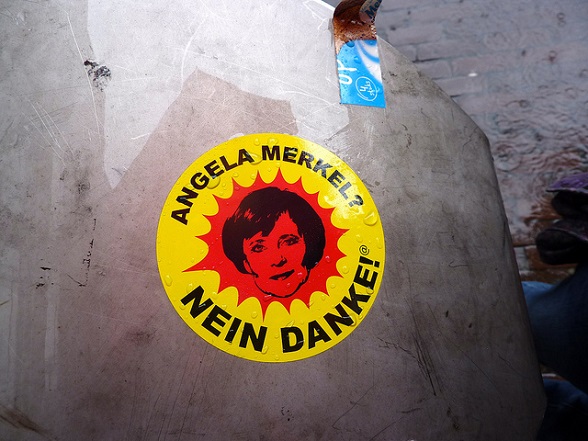
Berlin’s election results appear to represent a new phase in Merkel’s leadership. Although there were many essential topics on the table, such as Berlin’s exploding housing market, the city’s old infrastructure and the lack of investment in education, Berlin’s elections were centered around the refugee crisis. This is partially due to the AfD which succeeded in turning the current regional elections on a referend on Merkel and her ‘Wir schaffen das’ policy. A few weeks ago, Merkel’s party, the CDU, suffered an embarrassing defeat against the AfD in the state of Mecklenburg-Vorpommern, Merkel’s own state, where the upcoming extreme right party gained more votes than the ruling CDU. The AfD seems to have taken good advantage of the national state of fear and insecurity, as you would expect from a self-respecting populist party. Nonetheless, it cannot be ignored that many traditional CDU-voters feel betrayed by the policies implemented last year, and see the AfD as the only real opposition against these policies. In the meantime, CDU has most likely lost its seat in the capital’s government.
The critics towards Merkel are somehow a result of her determination, her firm convictions and her strong beliefs about what kind of country she wants Germany to be. She will not yield to public opinion or political pressure from her own party when it comes to these convictions and beliefs. This is exactly her strength.
Following these election results, Angela Merkel has admitted errors and failures in the way the massive and ongoing income of refugees since 2015 has been regulated. She has even distanced herself from her own ‘Wir schaffen das’, by saying that in some cases this is just an empty formula. She has taken blame for the loss of power in the capital and has even acknowledged that more attention should have been given to the will of the voters. However, Merkel does not question the decision itself. She might question the methods and the structure but she does not question the decision of opening Germany’s borders during that summer of 2015. She is still convinced that at that point, there was no other option. She has given the refugee crisis of Europe a face: her own face. And despite many critics, defeats and failures, she has never distanced herself from that decision.
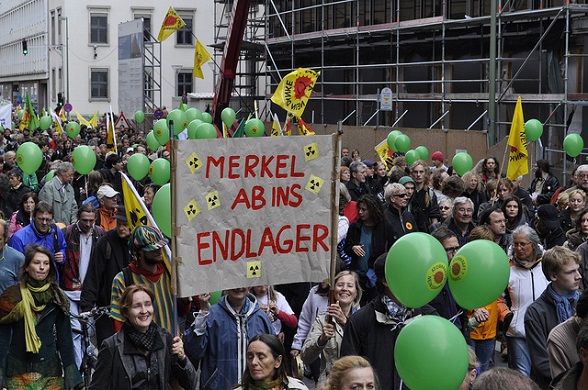
The critics towards Merkel are somehow a result of her determination, her firm convictions and her strong beliefs about what kind of country she wants Germany to be. She will not yield to public opinion or political pressure from her own party when it comes to these convictions and beliefs. This is exactly her strength. This is what makes her a unique political leader in comparison to all those politicians out there that will shout whatever public opinion wants to hear. This is also why many have pointed out the increased tendency towards a one-(wo)man ruling of the CDU. This is why so many people in Portugal were angry at her, and why Germans are now blaming her. And this is why she is one of the most powerful women in our times.


